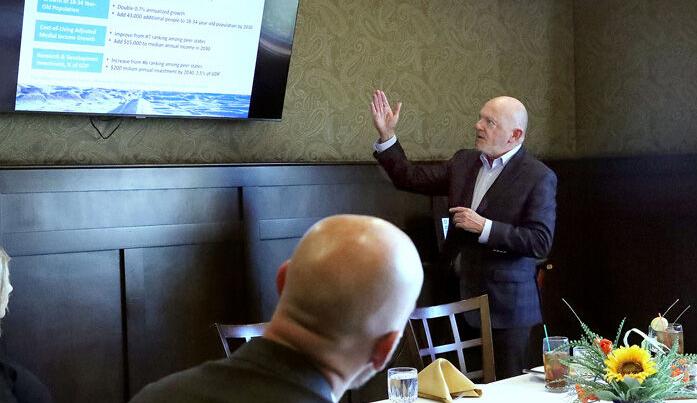Does Nebraska’s tax strategy need to be modernized?
A proposal from Omaha’s Platte Institute, called Blueprint Nebraska, would change the state’s tax rates to better foster growth in the current economic landscape.
Among its ideas, Blueprint Nebraska wants to reduce state income tax rates, fully eliminating state income taxes on earnings up to $50,000 for individuals and $100,000 for married couples filing jointly.
This would be paid for by eliminating many sales tax exemptions, income tax deductions and corporate tax credits.
“Everything above the $50,000 is a flat tax, and trying to get that as far under 5% as we can get it. In our plan, with the revenues we’re working with in our modeling, we can get it to 4.99%,” said Blueprint Nebraska Initiative President Jim Smith at a special gathering on Thursday at Riverside Golf Club.
Local leaders in attendance were Mayor Roger Steele, Hall County Commission Chair Pam Lancaster, Grand Island Area Chamber of Commerce Director Cindy Johnson, representatives from Central Community College, Grand Island Regional Medical Center and Grand Island Public Schools, and manufacturing, housing and banking leaders.
Other tax areas are addressed in the Blueprint proposal:
SALES TAX
The current sales tax rate would remain the same, and exemptions for unprepared groceries and most medical services would remain in place.
“For those at the low-income groups, as well as our retirees, we want to do no harm,” Smith said. “Let’s keep those in place.”
INCOME TAX
For individual income taxes, Nebraska ranks 21st in the country and among its peer states is in the “middle of the pack,” Smith said, citing statistics from the Tax Foundation of Washington, D.C.
Nebraska’s top individual bracket is 6.84%, Smith said.
“You encounter that top bracket at a mere $31,000 for an individual,” he said. “We’re thinking about our young people we want to keep here, our retirees we want to be able to live their final years in Nebraska, that’s a bad position to put those folks into.”
He added, “I’d even go so far as to say it’s a workforce issue for Nebraska.”
CORPORATE TAX
For corporate taxes, the plan proposes phasing out current refundable and nonrefundable tax credits in favor of investing in research and development.
Nebraska ranks 32 for corporate income taxes, Smith said.
“We have to rely on business incentives oftentimes to ourselves favorable or competitive with our peer states,” he said.
INHERITANCE TAX
The inheritance tax would be eliminated.
Nebraska is one of only five states that still has this tax, Smith said.
“It is an issue for our retirees, but we do not want to yank the carpet out from underneath our local governments that may have built some reliance upon that tax,” he said. “There’s enough revenues in this process here that we could backfill those dollars with some type of state aid to counties to cover that.”
Hall County receives roughly $1 million per year in inheritance tax funds, which are primarily used for property tax relief.
PROPERTY TAX
At a rank of 41, property taxes are “way too high” in Nebraska, Smith said.
“Property taxpayers tend to be captive in that they cannot pick up their land and move with it, but it’s a burden to our agricultural industry, to our businesses and to our homeowners to be ranked at 41st,” he said.
The ranking does not consider credits from Legislature to property taxpayers
“If you were to factor that in, you may be in the high 30s, but still, much too high for us to be a favorable place to live,” he said.
SALES & USE TAX
Nebraska ranks 15 for sales and use tax, Smith said, which is competitive, but “we don’t get anything from that” and there’s not much economic development benefit for the state.
“Typically, when you look at the impact of taxes on behaviors, sales and use tax as a whole, you don’t really move your economy a lot with that,” he said.
More is being spent on goods than services, Smith said.
“Why is that important? On those goods that are declining, we exempt a sizeable amount of goods. Services we exclude from taxation,” he said. “That’s what that 15 ranking means. We have this very narrow base of taxation around sales and use.”
Smith cautioned against expanding the state’s sales tax base.
“You may be paying a tax on something tomorrow that you’re not paying a tax on today. Many will classify that as a tax increase,” he said.
Nebraska’s sales tax base has declined by half since 1970, he added.
Another think-tank organization in the state — OpenSky Policy Institute of Lincoln — previously has expressed concerns about the Blueprint Nebraska proposals:
- Many families likely would pay more from sales taxes on formerly exempt items, and low-income families would be harmed through elimination of the Earned Income Tax Credit;
- County governments likely would experience revenue losses without the inheritance tax, and would need to cut services or raise fees and other taxes, such as property taxes, to offset the losses;
- Potentially low revenue growth in the state could create budget challenges, which would make it difficult for the state to fund key services such as education and health care, and force local entities to increase property taxes to offset the cost of providing vital services.
To read the Blueprint Nebraska Initiative plan, visit platteinstitute.org/blueprint-nebraskas-report-on-the-economic-and-fiscal-impact-of-tax-modernization.

